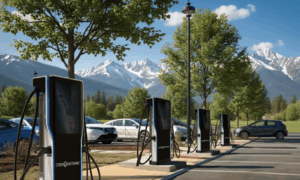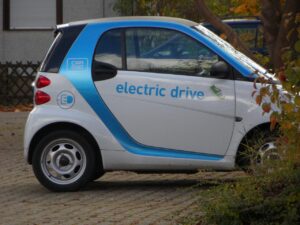
Home / EV Charging News / The Role of Smart Grids in Balancing Electric Car Charging and Renewables: Exploring how smart grids can optimize the integration of electric vehicles with renewable energy sources, managing charging demand and grid stability
Electric vehicles are becoming increasingly popular due to their environmental benefits and advancements in technology. Similarly, renewable energy sources like solar and wind power are gaining momentum as viable alternatives to fossil fuels. However, the growing number of electric cars and the intermittent nature of renewable energy pose challenges for the power grid. Smart grids offer a solution by leveraging advanced technologies and intelligent systems to optimize the integration of electric vehicles with renewables.
A smart grid is an intelligent electricity distribution network that utilizes communication and information technologies to monitor, control, and manage the flow of electricity. Unlike traditional power grids, smart grids enable bidirectional communication between the utility provider and consumers, allowing for real-time data exchange and decision-making.
The global market for electric vehicles has witnessed significant growth in recent years. With advancements in battery technology, increased driving range, and improved charging infrastructure, electric cars are becoming a mainstream choice for consumers. Simultaneously, the adoption of renewable energy sources has also surged. Solar and wind power installations are on the rise, providing a cleaner and sustainable energy option.
Charging electric cars poses several challenges, such as the strain on the power grid during peak charging periods and the need for efficient energy management. Without proper planning and infrastructure, a large number of EVs charging simultaneously can overload the grid and cause power outages. Smart grids address these challenges by implementing intelligent charging algorithms and load management techniques.
Smart grids offer numerous benefits for electric car charging. They enable demand response programs, allowing utilities to incentivize EV owners to charge their vehicles during off-peak hours when electricity demand is low. By shifting the charging load to non-peak periods, smart grids reduce stress on the grid and minimize the need for additional power generation capacity. Additionally, smart grids can optimize the charging process by considering factors such as grid stability, energy prices, and renewable energy availability.
Demand response programs play a crucial role in managing the charging demand of electric cars. These programs incentivize EV owners to modify their charging behavior based on grid conditions and electricity pricing. By offering lower electricity rates during off-peak hours, utilities encourage users to charge their vehicles when the demand for electricity is lower, ensuring efficient utilization of grid resources.
One of the key features of smart grids is the integration of vehicle-to-grid (V2G) technology. V2G enables bidirectional energy flow between electric vehicles and the power grid. When connected to the grid, EV batteries can serve as a source of electricity, injecting power back into the grid during peak demand periods. This not only helps stabilize the grid but also provides an additional revenue stream for EV owners through vehicle-to-grid services.
Smart grids facilitate the seamless integration of renewable energy sources into the power grid. By monitoring the availability of solar and wind energy, smart grids can optimize the charging of electric vehicles using clean and sustainable power. This integration reduces dependence on fossil fuels and maximizes the utilization of renewable energy resources, contributing to a greener and more sustainable transportation system.
Maintaining grid stability and power quality is essential for reliable and efficient operation. Smart grids employ advanced monitoring and control systems to ensure the stability of the power grid when charging electric vehicles. They can dynamically manage the charging load, balance power supply and demand, and mitigate potential issues that may arise from the intermittent nature of renewable energy sources.
Effective communication and control systems are at the core of smart grid infrastructure. These systems enable real-time data exchange between electric vehicles, charging stations, and the power grid. By leveraging this data, smart grids can optimize the charging process, ensure grid reliability, and provide valuable insights for future infrastructure planning.
As smart grids rely heavily on digital technologies and interconnected systems, cybersecurity becomes a critical concern. Safeguarding the smart grid infrastructure against cyber threats is paramount to maintain the integrity and reliability of the system. Robust cybersecurity measures, including encryption, authentication protocols, and intrusion detection systems, are implemented to protect against potential cyber attacks.
Governments around the world are recognizing the importance of smart grids in promoting sustainable transportation and renewable energy integration. Many countries have implemented policies and incentives to encourage the adoption of electric vehicles and the development of smart grid infrastructure. These initiatives aim to create a supportive ecosystem that facilitates the growth of clean and efficient transportation systems.
Several cities and regions have already implemented smart grid solutions to manage the charging demand of electric vehicles and optimize renewable energy integration. Case studies and success stories from these pioneering locations showcase the effectiveness of smart grids in achieving grid stability, reducing carbon emissions, and promoting sustainable transportation.
The role of smart grids in balancing electric car charging and renewables is expected to grow in the coming years. Advancements in technology, such as improved battery storage, grid-edge intelligence, and machine learning algorithms, will further enhance the capabilities of smart grids. As the world transitions towards a greener and more sustainable future, smart grids will play a vital role in supporting the integration of electric vehicles with renewable energy sources.
Smart grids are revolutionizing the way we charge electric vehicles and integrate them with renewable energy sources. They offer numerous benefits, including optimized charging, grid stability, and efficient utilization of renewable energy. By managing the charging demand of electric cars and ensuring the stability of the power grid, smart grids pave the way for a sustainable and greener transportation system. With continued advancements in technology and supportive government policies, the role of smart grids in balancing electric car charging and renewables will continue to evolve and shape the future of transportation.



